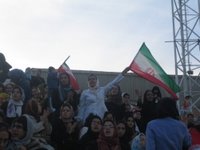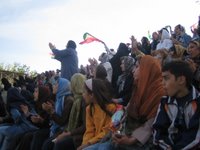Pictures from Tehran
Picture 1
In a suburb of Tehran:
I am surrounded by some men telling me what they think of nuclear row. They are excited to tell their ideas. They are not patient and interrupt each other so each one's words is cut off with the words of the other one running into it. The people of this suburb are all farmers. Beside farming, they have livestock. I have been speaking to them for only a few minutes but still I can guess for whom they all have voted in recent presidential election. They tell me that they support Ahmadi-nejad the Iranian newly elected president who sounds more and more extreme with his stance against Israel and the West. Ahmadi-nejad started with wishing Israel to be wiped off the map and then later went on to say that the Holocaust has been a made up myth. Then after, he threatened the West by saying that if the West continues against the right of Iran for having nuclear energy, the Islamic Rep of Iran may take more serious measures. Everybody knows he is referring to the possibility of getting out of NPT.
One of the men begins excitedly: "You see, we want to have the nuclear power. As our dear president has stated. Why shouldn't we have it when others have it? Why we who have invited inspectors from all over the world, from the West, from the Soviet Union (he means Russia) can't have nuclear energy?"
An old man, wearing white beard, is more emotional when he begins to speak. He almost shouts "You see, this is discrimination. What's the reason that we who have signed the treaty can't have it and the world doesn't bother questioning others who have not signed it?".
The third man continues: "The oil is going to finish some day. Everybody knows that it is not infinite. The West wants to have nuclear power just for itself because it wants to rule the world."
When asked about sanctions or a probable invasion or war, they answer in harmony: "We are not afraid, neither from a war nor sanctions." The old man continues:" Haven't we been under sanctions during the last 27 years? We also have fought against Iraq for eight years. We are experienced. All of us have been in war fronts. We know what's war. We don't want it. But if it happens, we are ready for it".
Picture 2
In the northern mountains of Tehran:
The area called Darband, is a place the people usually come to spend their vacation time mostly during summer. It's a place to flee the heat and the noise of urban life, for resting in one of the many restaurants, drinking a cup of tea or having food with friends or family. I can see people walking, coming and going, sitting, eating or drinking. I come across four MTV style young men. They are in their early 20s. They are millions of young ones at this age all around the world, chewing gum, stubby hairs standing on their heads by the help of a handful of hair gel, having stripped sweaters on, their hands in their pockets. When asked about the future and their dreams, they all say they demand change. Although other people around are listening to us (people tend to be cautious when speaking in public), two of them are even that bold to comment: "Regime change, we want the regime change!"
They don't speak enthusiastically; I can feel very well the despair and the frustration in their voices. They say their utmost need in life is money. They say they would love to have lots of money because "If one has money, then he can have everything!" I ask them about the nuclear row. With their stands against the system to demand a deep change in it, they shock me by saying "We need nuclear energy, yes, we want it!" One begins and three others nod their heads and repeat the same.
Picture 3
An old roofed small bazaar in south of Tehran, the poor area of the city:
It's holiday but still the place is crowded. I can imagine that during the normal days, it can be a hellish place with lots of noise, quite messy. There are fruit shops around. The people come and go and some do shopping. Most of women have chadors on. I come across two young girls who happened to be sisters. They don't have chadors but tight manteaus-a new fashion for Iranian girls who demand to look more beautiful. Both of them are wearing make up. Well, they don't follow the official code for clothing to be loose long manteaus under a thick black chador but still they both defend the official stand because the poor quarters of the city have always been a stronghold of Islamic rulers in Iran.
The elder one begins and the other one repeats "Yes, we need the nuclear power. Why not?" Again the elder one continues "If there is going to be any trial for having the nuclear bomb, then the priority should be given to those countries which actually have used it against other nations." She doesn't mention any names, but both she and I know which country she means. I ask them about sanction. The younger one answers "We want it!" I thought she didn't hear me, so I repeated my question. "I said 'sanctions.' What you think of a sanction?" She repeats the same answer. Now I can see that the poor girl doesn't know the meaning of the word- "sanctions."
Usually there is a big gap between the ideas of the majority of Iranian population and the official stance. What the system thinks, the people think the contrary. When the officials say something, the people try to do the contrary. Iranians are deeply political. The politics is in the air they breathe in; it's a part of their daily lives. It doesn't need them to read or to do research. The news, the analysis goes mouth to mouth, through direct contacts, face to face or through telephone and recently on the cell phones. The speed of travel for rumor and gossip is quite high. You hear something and then you can see tens of others repeating it within a very short time. It is astonishing. BUT, the reaction to the nuclear row, to the stance of the West and whatever exchanged between EU and Iranian negotiators has turned out to be an exception here. Strangely enough, the people are supporting the government. While only two years ago, at the beginning of the Iraq invasion, many wished that it could also happen to Iran, now the people have changed their collective minds and say they are not afraid of a war. If it breaks, they are going to resist. Nuclear energy has turned to be a national pride for a vast majority of Iranians. Call it ignorance or whatsoever else you wish, it's a fact. The arrogant tone of Ms. Rice, the reality that some countries have nuclear bomb - especially Israel- and nobody bothers to question them, has deepened this belief in Iranians that they should have the nuclear energy too. When most of independent and reformist dailies are shut down and there is no other voice to enlighten the people on the realities regarding the nuclear row, the mere things heard these days in the official stand. Iranian government has succeeded in zigzagging and manipulating the deepest sentiments of the people, and their dearest memories. Turn on the radio or switch on your TV in Tehran these days and you hear that they compare the nuclear energy with the oil industry nationalizing movement led by the late Dr Mohammad Mosaddeq. The Iranian government is emphasizing that the only path they are following is peaceful and they are merely doing it for economic reasons. Being honest or not, it gives them a stronger support among those citizens who are wise enough to hate war and direct confrontation with the West.
The other fact should be taken into consideration is that the people do not know about sanctions and the real impacts of it on their lives. They don't know exactly which measures are going to be taken against Iran. They do not know about the realities of life under sanctions. When many of them are not like the young girl who didn't know even the meaning of the word, but still their knowledge on the consequences of such measures against the country doesn't go much farther.
">Comment





